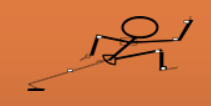Perth Hills Vertigo Physiotherapy
The vestibular system is responsible for maintaining our balance and our sense of which way is up. If compromised, you may have a sense of vertigo/dizziness or balance problems, or a favourite word Oscillopsia.
The most common cause that we see in clinic is Benign Paroxysmal Positional Vertigo (BPPV), but other causes include Labyrinthitis, Vestibular Neuritis, Meniere’s Disease or central causes such as stroke. Vestibular hypo function is a common outcome for all of these presentations
What is vertigo?
Vertigo is the sensation of movement, spinning or swaying when the body isn’t actually moving. It may feel as though you’re falling over, loosing your balance or spinning despite not moving. And YUCK - nausea and vomiting.
What is Vestibular Physiotherapy?
Vestibular Physiotherapy involves specific and expert assessment of the vestibular system so as to determine the cause of your vertigo. The appropriate treatment and sequence of exposure to vestibular exercises is determined by this initial assessment.
The Vestibular System 101
The vestibular system is divided into three parts: peripheral apparatus, central processes and motor output.
Within your skull, deeper than the inner ear, the peripheral apparatus consists of semi-circular canals (oil filled canals that tell your eyes where to go) that sense angular motion and otolith organs (crystals are here) which sense linear motion (due to the weight of the crystals).
The central processes are in your cerebellum which receive and integrate information from the peripheral apparatus along with other inputs including vision, foot contact, head/neck interaction and other proprioceptive organs.
The motor outputs are produced by the cerebellum in response to the information it receives as to maintain your posture and balance.
How can Vestibular Physiotherapy help you?
At Scott St Physiotherapy, our clinicians are skilled in assessing and treating a range of vestibular disorders and if we believe Physiotherapy isn’t appropriate for your condition, we will refer you to the right service. We can help you through:
Reducing your dizziness and vertigo symptoms
Improving your balance
Reducing your risk of falls
Improving your quality of life
Through vestibular rehabilitation, we can train your brain to better process vestibular information to reduce altered vision, foggy head, dizziness, oscillopsia, nausea or vertigo symptoms.
What is BPPV?
The most common cause of vertigo and dizziness that we see in clinic is Benign Paroxysmal Positional Vertigo or BPPV.
BPPV is a randomly occurring, but recurrent cause of vertigo. A crystal or 100s dislodge from the otolith and find their way into one of the semi-circular canals.
This causes havoc when moving the head, most commonly when rolling over in bed or sitting up in bed. This is caused by the canal shifting 90 degrees and the crystal then falling to the bottom of the canal. The oil move as the crystals falls and your eyes start darting left/right or rotary each with a relative fast phase, this is called a nystagmus. This usually lasts a few seconds then stops as the crystal settle at the bottom of the canal and hence the oil stops moving with it.
If everything is where it should be, the eye movements are match perfectly with head rotation and no nystagmus occurs.
Treatment for BPPV
BPPV is a very treatable condition. Once the clinician determines which canal is affected, they will put you through a series of movements which will displace the otoconia crystals out of the semi-circular canals back to their proper place . They will repeat the manoeuvre to ensure all the crystals have been removed from the canal.
Things you should know:
After treatment, you should avoid lying on the affected side for 12-24 hours to reduce the likelihood of recurrence
Patients often feel quite nauseous after treatment for an hour to a day. This is normal and should settle without further intervention.
Recurrence is common for BPPV. Once you’ve had it once, it is likely to happen again. Our physiotherapist will provide you information on how to treat yourself at home if it does return.
If you have had BPPV for longer than a few days to a week, our Physiotherapists will assess your vestibular system further. Patients often develop vestibular hypofunction which needs to be addressed. These patients will be given further exercises to practice at home to continue to improve their balance.
